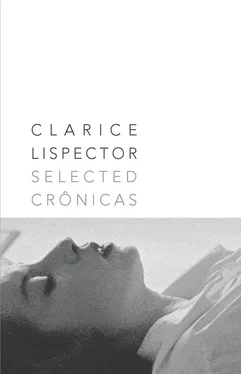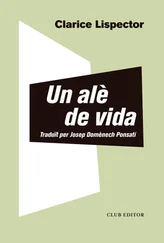— Well then, she said, I’ll be going.
She walked away slowly and closed the door quietly behind her. I went on staring at the closed door. What a strange child you are, I thought to myself. I went back to my typing.
But I was stuck at the same sentence. Well — I thought impatiently, looking at my watch — now what’s the matter? I sat there, searching restlessly in my mind, searching in my mind to discover what was troubling me. Just as I was about to give up, I saw that impassive face again: Ofélia. Something started to cross my mind, when to my surprise, that face was leaning over me in order to be able to hear what I was feeling. I slowly pushed away the typewriter. Reluctantly, I began moving chairs out of the way, until I came to a halt in the doorway of the kitchen. On the floor lay the dead chick. Ofélia, I impulsively called after the girl who had fled.
From an infinite distance, I saw the floor. Ofélia. From afar, I tried in vain to reach the heart of that silent girl. Oh, don’t be so frightened! Sometimes people kill for love, but I promise you that one day you will forget everything, I promise you! People do not know how to love, do you hear me, I repeated as if I might reach her before she should proudly serve nothingness in refusing to serve the truth. I who had forgotten to warn her that without fear there was the world. But I swear that this is breathing. I was very tired. I sat down on the kitchen stool.
Where I am still sitting, slowly beating the mixture for tomorrow’s cake. Sitting, just as if throughout all these years I had been patiently waiting in the kitchen. Beneath the table today’s chick shudders. The same yellow, the same beak. As we are promised at Easter, He will return in December. It is OféIia who has not returned: she grew up. She went away to become the Indian princess whose tribe awaited her in the desert.
RACING AGAINST THE TYPEWRITER
The world is so enormous, dear God, and to think that one day I shall have to die. How many moments have I left before death comes? I plead for more than moments. Not because those moments are so brief but because they are so rare and loving them can kill. Do I love you, precious moments? Reply, for life is slowly killing me. Do I love you, precious moments? Yes or no? I wish others to know what I shall never understand. I prefer to understand rather than be given explanations. Shall I have to spend my entire life waiting for Sunday to pass? And what about the charwoman from Raiz de Serra who gets up at four in the morning to work all day in the city before returning late at night to Raiz de Serra, where she falls into bed to be up at four next morning to go through the same exhausting routine. I shall tell you my mortal secret: living is not an art. Those who made such claims were lying. Ah! there are certain days when everything becomes so dangerous. But the typewriter goes faster than my fingers. The typewriter writes inside me. And I have no secrets apart from mortal ones. Those are all I need in order to become a creature with eyes, who will die one day. How can I explain what has just occurred to me? For I can now see that there is a price to be paid for everything, and that life is so costly it can even bring about death. To stroll through the countryside with a phantom-child is to walk hand-in-hand with what we have lost and, for all their beauty, those unending fields are of no help: hands clasp like claws for fear of getting lost. Perhaps it would be better to kill the phantom-child in order to be free? But what would then become of those great fields where no flowers have been planted other than that cruel little phantom-child? Cruel, because a child and demanding. Ah! I am too much of a realist. I walk alone with my own ghosts.
He now manages a shoe-shop. Not because he likes the job, but it was all he could find. He was forever asking himself: where did I go wrong? He meant in planning his future. There is no great mystery about becoming the manager of a shoe-shop. But once he himself poses the question and shows customers shoes as if he were not of this world, there is a reason for asking. Why, in fact? After all, he had been the brightest student of history at school and taken a keen interest in archaeology. But what he appeared to lack was any genuine appreciation of history or archaeology. All he had was learning. But no real understanding of prehistoric times when the world was uninhabited and fish had not yet been transformed into amphibians to provide food for humans. And to this day he sells shoes with the air of a scholar, as if his feet never touched this rough earth which wears out the soles of shoes.
I want to tell you about the little room I put under a spell with my imaginings. It was in a rented apartment which was furnished. But let me say first of all that when reality is unmasked without fear, nothing in the world could be more agreeable and real. Reality, even if imaginary, has no dream and almost no future: its every moment belongs to the present. And there is no fear. It is extraordinary. In this reality unmasked by the imagination without fear, the richness is no longer behind us like some memory or about to appear from some desired future. It is there, and breathing.
Let me try to describe in the simplest possible words something which is far from simple. The little room, as I told you, was furnished. It was difficult to say if the arrangement of the furniture was intentional or whether, in fact, any arrangement existed. In all probability the first woman to occupy the apartment had decorated it without any conscious plan, making life easier for subsequent tenants. For the abundance in that sitting-room had nothing to do with our past or our reminiscences — it was there. There was no austerity in that room. On the contrary, it had a certain chic and charm. But the room was haunted. Oh, there was no ghost. It was haunted in its own right. The light — the light in the room was real enough — the light of space or the sky above — without any suggestion of shadows. And yet the objects in the room were obscured by the light.
And such a lack of comfort. There was not a single chair in that room where a person could sit in comfort. Perhaps that is why visitors behaved as if they were being bitten, kept moving from chair to chair, jumping to their feet, and looking out of the window and up at the ceiling as if in search of some means of escape. And no guarantee of safety anywhere. That was the problem. There was no guarantee of safety in that room. Either one accepted being lit up in some way by one’s own ghost, or refused. There were no promises of any recompense.
There was a mirror in the room. It had been hung up in a silly position directly opposite the window — not to capture any view but simply the empty sky framed by the window — the mirror had nothing to reflect, repeat or copy: the window had become a rectangle of light hanging on a wall.
That room offered no reassurance. But if anyone fearlessly accepted being lit up, they sat for a moment on the edge of that uncomfortable chair like this — they sat there and glowed.
People saw things in such different ways. We became as wicked as champagne. It was not exactly a nice feeling: the room became stifling. And mischievous as we were, we did not know how to react to all that splendour except by bubbling. And by laughing our heads off at the slightest thing.
Even when there were few visitors the room looked crowded. But never to the extent of people knocking into each other. Visitors entering that room for the first time were so intrigued by the objects there that they scarcely noticed each other as they peered first at one object, then another, inquisitive and contemptuous. There were moments of silence. And then water could be heard spurting from a tap. The noise was coming from the kitchen sink which was in need of repair. No one appeared to mind the silence. Everyone seemed to be holding back a smile or some item of news, as the room grew brighter and brighter.
Читать дальше












